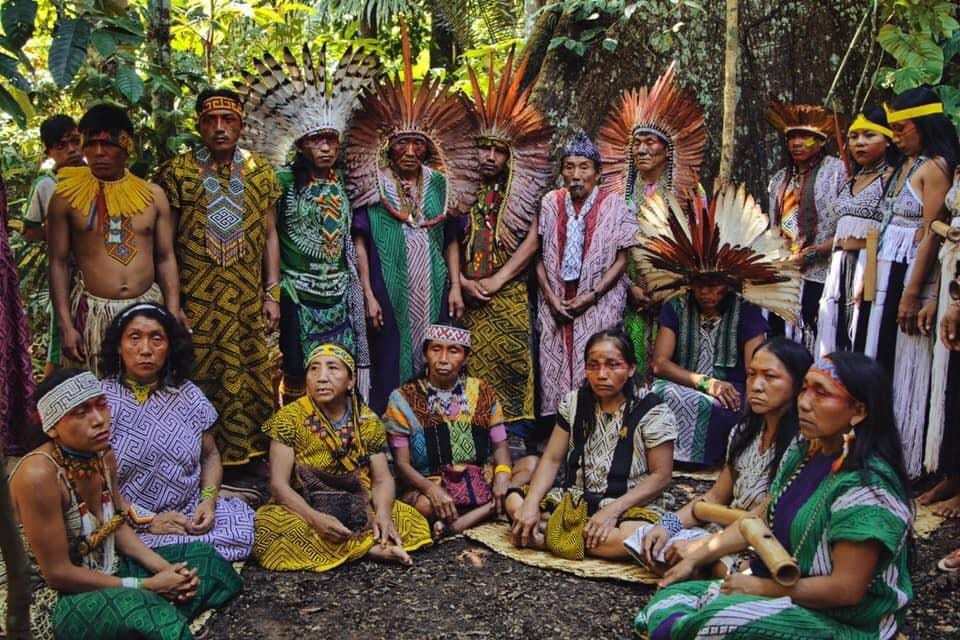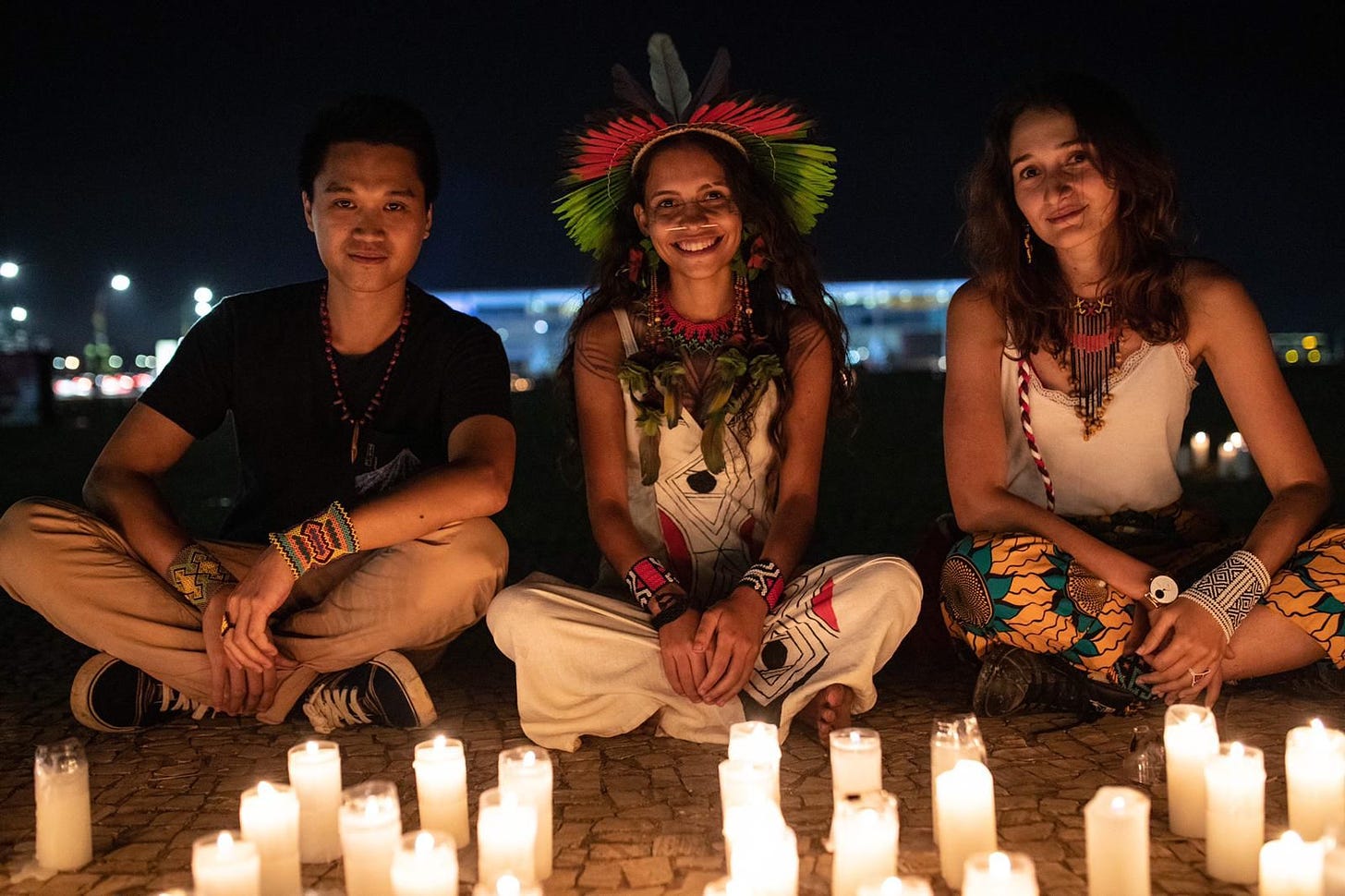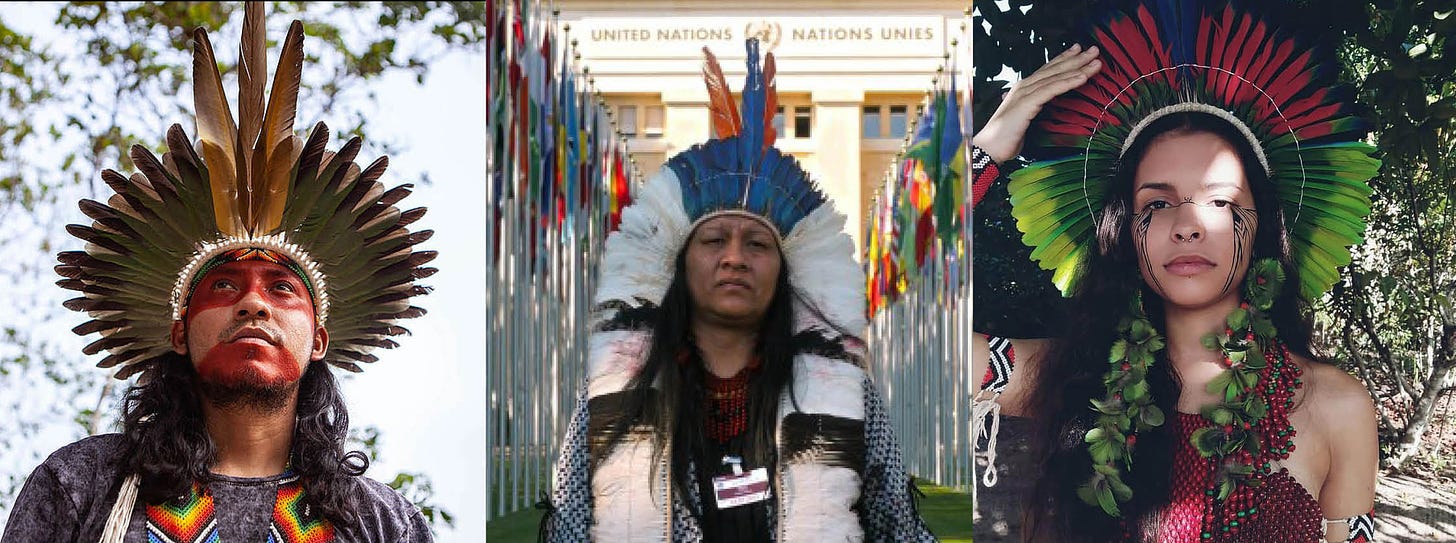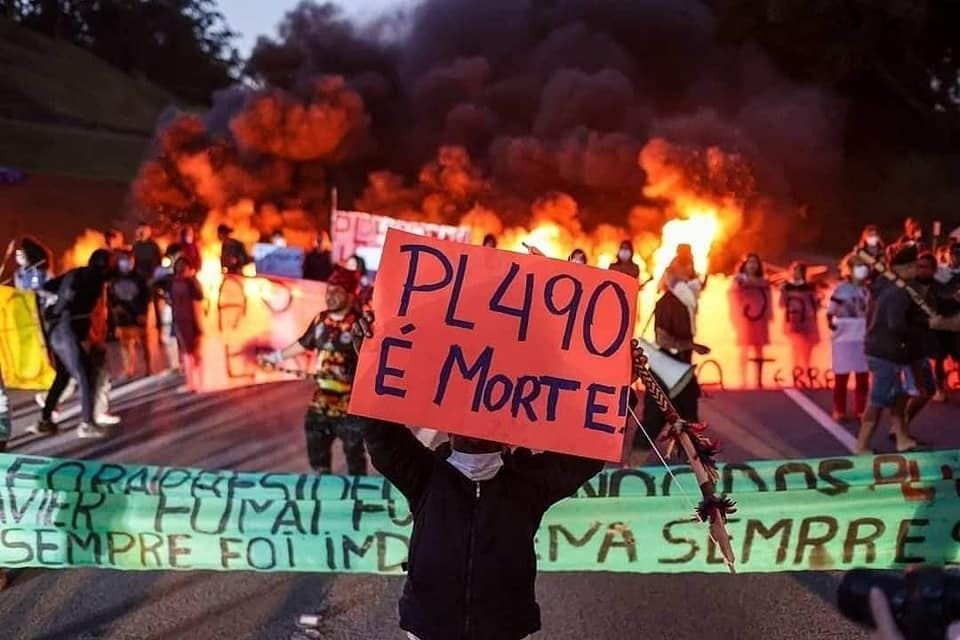Ever held a party and forgot to invite the main guests? The Green Fix on indigenous rights
Because saving the Amazon is a lot easier when you include the people who know how to save the Amazon.
Help support the Green Fix! If you find this newsletter useful, you can now buy me a virtual coffee (because doing this newsletter is easier when I have money to live and keep it running).
***
Today someone congratulated me on a year since I started the Green Fix.
I hadn’t even realised and my reaction was more or less - how did that happen?
The last year has tried hard to throw my plans into disarray. I wrote The Green Fix in quarantine, three times. I wrote and rewrote it at 2am when I couldn’t sleep from eco-anxiety. I wrote it on Notes on my phone on my way back from a funeral. I write it depressed, hopeful, overwhelmed, restless.
Professional and personal have blended together in these introductions where ultimately I’m just searching for new ways to say everything is chaotic and maybe it is for you too, but that’s OK. I’m hurtling through personal tipping points and the world is on fire but we’re still here and we can still do something.
And it was never just me. You’re all still here, subscribing. I have a team of volunteers now. And incredible interviewees doing incredible things.
So thank you for sticking with it so far. And if you’ve ever taken action or got involved in something as a result of seeing it in the newsletter - thank you (and let me know!)
Sappy speech over. Let’s get on with it.
****
The Green Fix is collaborative: Shape the newsletter by filling in this feedback survey.
***
I run the Green Fix for free. If you find it useful, help me out by sharing it:
What’s Going On?
Casual reminder: Humanity must change now to avoid most apocalyptic climate disasters in our lifetime, says IPCC report.
Useful: The report summary.European NGOs unite to boycott events sponsored by fossil fuel companies.
Relevant: Don’t believe fossil fuel company climate commitments. Here’s why.New report shows a third of the world’s trees are at risk of extinction.
Relevant: A hub for finding conservation efforts, searchable by region (or.. by tree).Europe’s top 25 banks are all failing to reach their own green pledges.
Useful: How to move your money to an ethical bank.Over 200 medical journals demand urgent climate action to avoid devastating impact on human health.
Useful: How does the climate crisis affect human health?20 meat and dairy companies are responsible for more greenhouse gas emissions than Germany, France or the UK.
Relevant: Tell world leaders you want to see them drive a shift to fairer food.Fossil fuel companies can no longer use obscure EU legal loophole to demand compensation for climate policies.
Relevant: What is this weird law that fossil fuel companies have been exploiting?
Focus On… Indigenous Rights in the Amazon
Alexandra Vázquez Mera spoke to Jiboiana members Léo Landon and Kelly Dochy about their work with indigenous Amazonian leaders to defend nature.

“Caring for Mother Earth is basically caring for our own bodies and minds. The body is the Earth, and the spirit is the Forest. We indigenous peoples want to reforest the spirits so that they can finally lovingly care for their bodies - ultimately, the Earth.”
Sonia Guajajara, Brazilian indigenous activist and politician
Could you tell us a bit about what you do?
Léo Landon: I’m French, I live in Paris. In everyday life, to eat and pay the rent, I’m a communications specialist. But in my more Batman kind of life, I work for solidarity organisation Jiboiana.
Kelly Dochy: I’m French/Mexican-American, born in San Diego, California. I always felt strongly about the rights of the indigenous peoples in the US. Last year, when I met Léo and Laëtitia [founders of Jiboiana], it felt very natural for me to help Jiboiana.
I’m running their Public Relations and right now, I’m helping to manage the Glasgow-Brussels project to get five indigenous leaders to major climate conferences in Europe: COY16, COP26, and a demonstration in Brussels against the EU–Mercosur free trade treaty.
[Useful: What is the EU-Mercosur trade deal?]
What is Jiboiana exactly?

Jiboiana supports the guardians of the Amazon rainforest. The Association was created at the end of 2019 by five French people. We work in agreement with the Huni Kuin people, a tribe that lives in Brazil, towards the protection of Amazonia, and to create an alternative way indigenous people can be heard in Europe.
We have already built water wells equipped with solar panels to provide clean water, and two nurseries for reforestation and food autonomy.
What made you start the Jiboiana project?
Léo: Indigenous peoples have been silenced for centuries. But now social media can be used to amplify their voices and share their deep connection to nature.
We are all guardians of nature, but we have forgotten it. Their wisdom and respect towards nature should inspire us to repair our relationship with the environment.
In the future, we aim to work with indigenous communities in other parts of the world. Indigenous communities all have the issue of land demarcation in common. Indigenous peoples should be allowed to own the rights of their own land.
In Brazil, a proposed bill called PL490 aims to deforest the Amazon and other forests by withdrawing all protection of the indigenous lands and opening them to agricultural exploitation (soy monocultures, cattle farms, and mining projects).
How are indigenous communities in the Brazilian Amazon experiencing the climate crisis?
Léo: Climate change and the problem of land demarcation impact the food security of indigenous communities. They can no longer hunt for survival and rivers are contaminated because of gold panning.
As we are fast approaching the Amazon’s ‘tipping point’, if we continue to deny the existence of the indigenous communities, they are in danger, and 80% of the biodiversity they protect is in danger with them.
The death of the Amazon will not only impact its frontline communities but will also endanger ecosystems everywhere.
Why is it important to have indigenous leaders at COP26?

Kelly: The main reason we need them included is climate justice. Climate change is affecting people unequally and those most affected are the ones who have done the least to cause it.
If the Amazon reaches a ‘tipping point’ it’s going to be a global issue, so the Amazonian indigenous peoples should have a say in the negotiations. COP26 is a strategic moment for climate action. We want to make sure that the indigenous communities are being heard by as many people as possible.
Léo:
Indigenous peoples have been removed from the table of negotiations for so long, even though they are the protectors of the ecosystem that gives us the oxygen that we breathe.
If the shift doesn’t happen today, if we don’t start including them in the issues that affect them, future generations will live in a world where the Amazon doesn’t exist, where no life can prosper and thrive.
What can we do?
Kelly: Raise awareness and when the opportunity is there, let indigenous people share their stories. You can also help by supporting organisations like Jiboiana.
Kelly: Also, be aware of your consumption habits: don’t consume products that come from deforested lands.
Support boycotts and protests against EU–Mercosur and other policies that threaten our global natural commons. With social media, we have a lot of tools, share information, speak with your friends and family.
Léo: Be an antenna in your own community and gather people that have the same interests as you. We all want to help, but we don’t know what to do, we don’t know the structures.
We all say that we are powerless, that we can’t do anything, but when you talk to a friend that shares your same opinion, you are two now, and more powerful.
Reach out to enterprises, politicians, hold them accountable. No one is powerless, we are powerless only when we assume that there are no opportunities to change things.
You can support Jiboiana’s campaign here, and follow them on Facebook and Instagram.
So Now What Do I Do?
LEARN MORE
Read: Why indigenous knowledge is the key to effective climate action.
Read: Why are hundreds of indigenous communities protesting in Brazil?
Tune in to the European Greens Climate Action Ideas Lab for free from 30th September - 2nd October.
TRY SOMETHING NEW
Sign the declaration by Amazonia for Life campaign to help preserve 80% of the Amazon rainforest (site is slow to load - have patience!).
Calling young filmmakers! Submit your climate action video to the Earthbeat Challenge by the 30th September. Winning entries streamed at COP26.
Register free for the UN’s SDG Action week this 22nd - 24th September.
CHANGE THE SYSTEM
Help leaders from the Amazon, Latin America & Caribbean, and whole Global South make it through the institutional barriers to get to COP26.
Take 5 minutes to go through these petitions to stop the EU-Mercosur deal.
Apply to join a working group for Generation Climate Europe. Recruiting working groups include Biodiversity, Climate Justice and Sustainable Development.
By the way…
Working on a cool sustainability project? Want a shoutout? Or just seen something you think deserves a mention in the Green Fix? Tell us about it.
Climate In Colour is an email newsletter dedicated to making climate science and environmental issues more accessible, diverse and colourful! Sign up for monthly updates.
Stay in the loop
You can connect with me on Instagram, Twitter and LinkedIn. You can also follow the Green Fix LinkedIn page here for more climate opportunities.
Know someone interested in environmental issues? Forward this email to them - we want to reach people who care about doing more for the planet, with your help.






